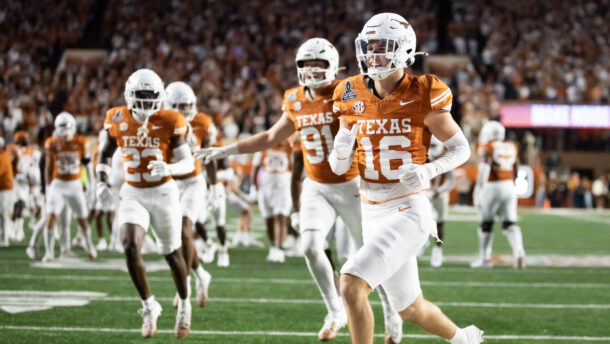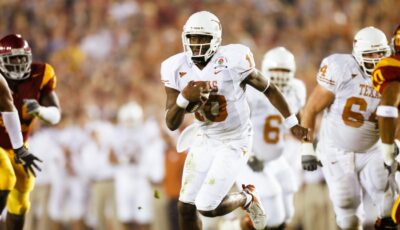Motivating his players at Alabama wasn’t an issue for Nick Saban when he arrived in 2007.
He hauled in two of the most impressive recruiting classes in SEC history each of the next two years, selling them on going down in history as the players who did away with the program’s lengthy downturn and restored pride to a landmark college football program.
They did, of course. Some in the ’09 class, like all-time great offensive lineman Barrett Jones, left Tuscaloosa with three national championship rings.
But returning the Tide to its status as one of the best two or three programs in the country and maintaining that carnal hunger to improve are two different challenges, as Saban now understands first-hand.
“The dynamics have changed,” Saban said, according to ESPN.com. “Just like with Barrett. All those guys came here because they wanted to play at Alabama and wanted to prove something. They were willing to do whatever the process was to be successful. They just wanted to buy in and do whatever we needed to do to do it.
“But as we’ve had more success, guys come here now — and this is not necessarily a bad thing — but in some ways for what Alabama can do for them.”
The ’13 and ’14 Alabama teams fell short of national championships in the Iron Bowl and College Football Playoff semifinals, respectively. Those teams were more or less equal in talent to the ’09, ’11 and ’12 groups that won titles.
But to those familiar with the day-to-day pulse of Alabama football, the more recent teams have been missing something. “Entitled” is cliche and too powerful of a word, but the more recent Crimson Tide teams have lacked the acute bite, that palpable intensity, of those initial championship teams. (We even noted as much last year.)
Saban’s motivational response, it seems, is to attempt to rekindle that attitude. He may have found a legitimate rallying cry with a defense that has slipped from all-time great in ’11 to merely good, but vulnerable at the end of ’14.
“My friends, they’ll be talking stuff, like, ‘Y’all don’t look like the other teams used to look in ’09 and ’11,'” linebacker Reggie Ragland told ESPN.com earlier this spring. “And Coach tells us people from the outside don’t believe we’re the same Alabama. We don’t play with the same intensity and tenacity.
“They’re not scared to play us any more.”
It’s a well-worn tactic in sports, particularly in football. But “nobody believed in us” just doesn’t resonate when a team has won three national championships in four years and spends almost all season ranked No. 1, as Alabama did in 2013. Now it must play well with the veterans on the roster, who have had to hear similar complaints from Alabama fans as Ragland — and digs from opposing fans hoping the team’s run of championships is over.
“I know criticism is something you have to let go in one ear and out the other, but it’s hard when you’re constantly hearing the same things, whether it’s personally or with your group, my group being the secondary,” senior cornerback Cyrus Jones said, according to AL.com.
“It’s definitely something the secondary takes personally. We have a point to prove, and that’s why we’re going out there — and those guys out there are working hard right now to come out and try to prove their point when it’s time to get back there on the field. And I know when I come back I’m going to be ready to prove all the doubters wrong. It’s definitely personally to me.”
Alabama exited spring practice with clear leaders, players like Ragland and running back Derrick Henry.
Jones, the former Alabama lineman, recently described Saban as being as grumpy and ornery as ever “because he cares so much” about winning. That attitude has trickled down to the players.
In the ESPN.com story, Ragland referenced the days when All-American linebackers Rolando McClain and then Dont’a Hightower played for the Tide. Saban was the coach in title, Ragland said, but those two were such strong leaders that the rest of the players would do whatever they said, setting the tone during the summer months or off the field when the coaches weren’t around.
The Tide is hoping to recapture that this season with Ragland.
“We’re known for stopping the ball, not making guys get an inch,” Ragland said. “I’m a competitor and I can’t stand when a guy gets an inch on me. That’s just the competitor in me, and I hope it’s in everybody. It eats away that [Saban] feels like the defensive side ain’t been the way that it’s been in the past.
“I want to try to get that standard back.”
It’s been difficult to force-feed it to Alabama’s new recruits, who, as Saban mentioned, now may come to Tuscaloosa to bask in the national spotlight or make themselves more attractive to NFL teams. Which is a good thing for the football program in some ways, as it attracts talent to the university’s program.
But now that the team has experienced, by its own ridiculous standards, some “failure,” it’s a little easier, as Saban described it to AL.com, to “sustain that kind of psychological disposition.”
This is an important summer for Alabama as it tries to shore up the secondary and take advantage of what should once again be a stout front seven on defense, find a starting quarterback, rebuild the offensive line and replace its entire group of starting receivers.
That’s a lot to accomplish for a team with national championship aspirations, particularly in the SEC West with such a razor-thin margin as teams like Auburn, LSU and even Ole Miss wait in the weeds to pounce on any misstep. No matter how good Saban is as a coach, he needs leadership among the players; guys who will enforce accountability with the rest of the roster to stay out of trouble and do the things necessary in the weight room, film room and otherwise to be prepared for the 2015 season.
Speaking on his Crimson Caravan stop in Huntsville, Ala., earlier this week, Saban laid out his message to the players as organized spring practice ended:
“We need to get our mojo back a little bit. We need to get our identity back. We used to be a team that nobody wanted to play, relentless competitors, tough, hard-nosed. We’ve got to get some of that back. Everybody needs to focus on what do you want to do to have a great team at Alabama, put the team first and not worry about a lot of other things that we had a few distractions with the last couple of years that I think affected how we finished the season.”
At Alabama this year, whether the team again competes for a championship the entire year or starts to drift back to the pack in the SEC will depend on more than talent. Can Saban engage his players to the same level that he did on those ’08 and ’09 teams? Will we witness an Alabama team with an edge, or just a bunch of talented football players stockpiling solid stats and accolades on a short-term way-station to the NFL?
We’ll find out in a little more than four months.
An itinerant journalist, Christopher has moved between states 11 times in seven years. Formally an injury-prone Division I 800-meter specialist, he now wanders the Rockies in search of high peaks.







